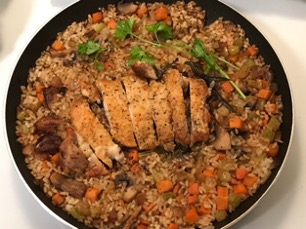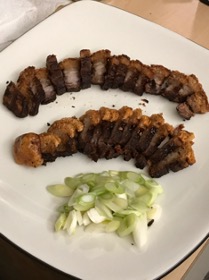
Cooking made easy
I learned how to cook as a grad student, and you can, too!
My jaw dropped when I heard: “Can I join you for dinner every night until my quals next Friday? I don’t want to think about anything other than my research presentation, and I know anything you cook will be good.” My friend and I both think going straight from the lab to the dorm after a long day is a great idea in New England winter, and this is a big reason why I cook at home. But it still surprises me to hear others say that I’m any good at it considering that I only learned how to cook after coming to grad school. Every grad student can learn how to cook just like I did. My mission is to share with you what I have learned in my journey to make cooking as easy as possible for you to start learning.
Everyone knows just how busy grad school can be. When you can easily get takeout and delivery, you might think cooking is a waste of time—it’s really, really not. First off, learning how to cook gives us an option. We can choose not to cook on any particular day, or we can choose to cook and spare the Uber driver from going out on a bike in an arctic blast. In addition, cooking means a lot more than just feeding ourselves. Too often in life, we have too little control over our surroundings. Be it the experiment that goes wrong, the interpersonal relationship that goes sour, or that professor on the oral exam committee that asks too many challenging questions. Many experienced cooks and bakers know that there is a hidden benefit for the life of a grad student when you cook: to take control. Like doing research, cooking is a combination of planning, creativity and execution. Unlike doing research, I have full control over my kitchen. If I mess up on my meal, there is no one but myself to blame. Instead of feeling helpless, I simply focus on making it right the next time. This is why cooking can feel therapeutic for us.
Given how easy it is to find recipes online, it is tempting to jump into a fancy dish that would steal everyone’s attention in a potluck. I, too, fell for this and quickly realized that such an one-off success actually set me back from progressing in everyday cooking. That’s simply too much work for a grad student. It was not until I set aside those fancy recipes that I began to enjoy cooking more regularly. I started out with one dish that I truly enjoy, spaghetti with garlic and olive oil, which I don’t mind consuming every time I practice cooking. I repeatedly prepared it until I really nailed it. The simplicity of the ingredients makes it a bliss to prepare, and I can focus on learning the techniques: heat control, knife cutting and mantecare (emulsifying the liquids to create that creamy consistency finish). Building on those skills, I can easily branch out to the rich spectrum of pasta in different flavors. This way, I can gradually expand my repertoire without ever getting overwhelmed.
To enjoy cooking more, it really helps to minimize the friction that comes with cooking. I make cleaning up as easy as possible. (If you are living at a grad dorm other than Site 4, you are stuck with hand washing.) I indulge myself with the best cleaning supplies I can afford: good sponges, brushes and strong dish soap (with the scent that I like). I turn dish soap into spray to save time, and I wear gloves so that I can run dishes under hot water. Explore tips over the Internet and adopt what makes cleaning more enjoyable for you. If you are cooking for yourself, meal planning and grocery shopping can take as much work as cooking itself. For this reason, knowing how to cook several dishes with similar ingredients is immensely helpful.
You will naturally know that you arrive at the next level when too much food and deserts are sitting in your kitchen. Fear not! Share your food. Make friends. Build a community. After all, we go to grad school in order to share our gift to the world. The great paradox about research is that it takes time to make an impact, but as human beings, we need constant gratification to move forward. So go have a hearty meal with friends now while you are working on the paper draft that will revolutionize the field in a decade.


Share this post:
